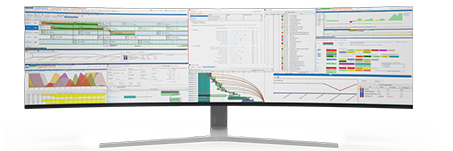Scheduling for Reconfigurable Manufacturing Systems
The ability to adapt to changing demands while maintaining operational efficiency is crucial in chemical manufacturing. Reconfigurable manufacturing systems (RMS) have emerged as a solution to this challenge, allowing facilities to easily adjust their production processes. However, to fully harness the benefits of RMS, an effective scheduling system is essential.
This blog explores the significance of scheduling in chemical manufacturing, with a focus on integrating PlanetTogether with leading ERP, SCM, and MES systems such as SAP, Oracle, Microsoft, Kinaxis, and Aveva.
The Evolution of Manufacturing Systems
Traditionally, chemical manufacturing facilities operated with fixed production lines that were optimized for specific products. This approach, while efficient for large-scale production of a single item, lacked the flexibility needed to respond to market changes. Enter reconfigurable manufacturing systems – a paradigm shift that allows facilities to adapt quickly to varying production requirements.

The Role of Scheduling in Reconfigurable Manufacturing Systems
Scheduling plays a pivotal role in the success of reconfigurable manufacturing systems. It involves planning and coordinating production activities to ensure optimal resource utilization, minimize downtime, and meet customer demands. In chemical manufacturing, where precision and adherence to timelines are critical, an efficient scheduling system is non-negotiable.


PlanetTogether: A Game-Changer in Scheduling
PlanetTogether, a leading advanced planning and scheduling (APS) solution, stands out in the realm of manufacturing optimization. Its intuitive interface and robust features make it a go-to choice for facilities aiming to enhance their scheduling capabilities. Let's delve into how PlanetTogether seamlessly integrates with ERP, SCM, and MES systems to create a holistic manufacturing ecosystem.
Integration with SAP
SAP, a powerhouse in enterprise resource planning, can be seamlessly integrated with PlanetTogether. This integration ensures real-time data exchange, allowing for accurate and up-to-date scheduling decisions based on the latest information from various departments.
Oracle Integration for Streamlined Operations
PlanetTogether's integration with Oracle brings a new level of efficiency to chemical manufacturing. By connecting production scheduling with Oracle's comprehensive suite of business applications, facilities can achieve end-to-end visibility and control over their operations.
Microsoft Dynamics: A Unified Approach
For chemical manufacturers leveraging Microsoft Dynamics, integrating with PlanetTogether brings a unified approach to scheduling and production planning. The synergy between these two systems enables a smooth flow of information, enhancing decision-making processes.
Kinaxis Collaboration for Supply Chain Optimization
The collaboration between PlanetTogether and Kinaxis addresses the intricacies of supply chain management in chemical manufacturing. By aligning production schedules with supply chain dynamics, facilities can optimize inventory levels and respond swiftly to market changes.
Aveva's MES Integration
PlanetTogether's integration with Aveva's Manufacturing Execution System (MES) enhances the synchronization between production planning and execution. This integration facilitates real-time monitoring and control, ensuring that the scheduled production plans are executed seamlessly on the shop floor.
Overcoming Challenges in Implementation
While the benefits of integrating PlanetTogether with ERP, SCM, and MES systems are substantial, challenges may arise during implementation. It's crucial to address these challenges proactively to ensure a smooth transition and maximize the return on investment.
Data Accuracy and Consistency
Maintaining accurate and consistent data across integrated systems is paramount. Discrepancies in data can lead to scheduling errors and inefficiencies. Regular audits and data validation processes should be in place to address this challenge.
Employee Training and Adoption
The transition to a new scheduling system requires proper training and change management. Employees need to be familiar with the new tools and processes to ensure a seamless adoption that doesn't disrupt daily operations.
Continuous Improvement
Scheduling for reconfigurable manufacturing systems is an ongoing process. Regularly reviewing and optimizing schedules based on performance metrics and feedback is essential to adapt to changing market conditions and internal dynamics.
In the world of chemical manufacturing, embracing reconfigurable manufacturing systems is a strategic move. However, to truly unlock efficiency and agility, integrating advanced scheduling solutions like PlanetTogether with ERP, SCM, and MES systems is imperative.
The seamless collaboration between these systems empowers chemical facilities to navigate the complexities of modern manufacturing, ensuring they stay competitive and responsive to ever-changing market demands.
Are you ready to take your manufacturing operations to the next level? Contact us today to learn more about how PlanetTogether and integrated scheduling solutions can help you achieve your sustainability goals and drive success in the chemical industry.